TH60116E Dissertation: Brexit Effects on Hotel Revenue Management
VerifiedAdded on 2022/10/01
|19
|4832
|15
Thesis and Dissertation
AI Summary
This dissertation investigates the effects of Brexit on revenue management within the Interstate Hotels group. It begins with an introduction to the topic, outlining the research problem, rationale, objectives, and questions. The study aims to examine the impact of Brexit, determine its elements affecting revenue management, and recommend mitigation measures. The dissertation includes a literature review exploring revenue management techniques in the hotel industry. The methodology chapter details the research design and methods. The findings are presented in the fourth chapter, followed by a conclusion and recommendations that summarize the research and link objectives to findings, providing actionable insights for the Interstate Hotels group to navigate the challenges posed by Brexit and improve revenue management strategies.
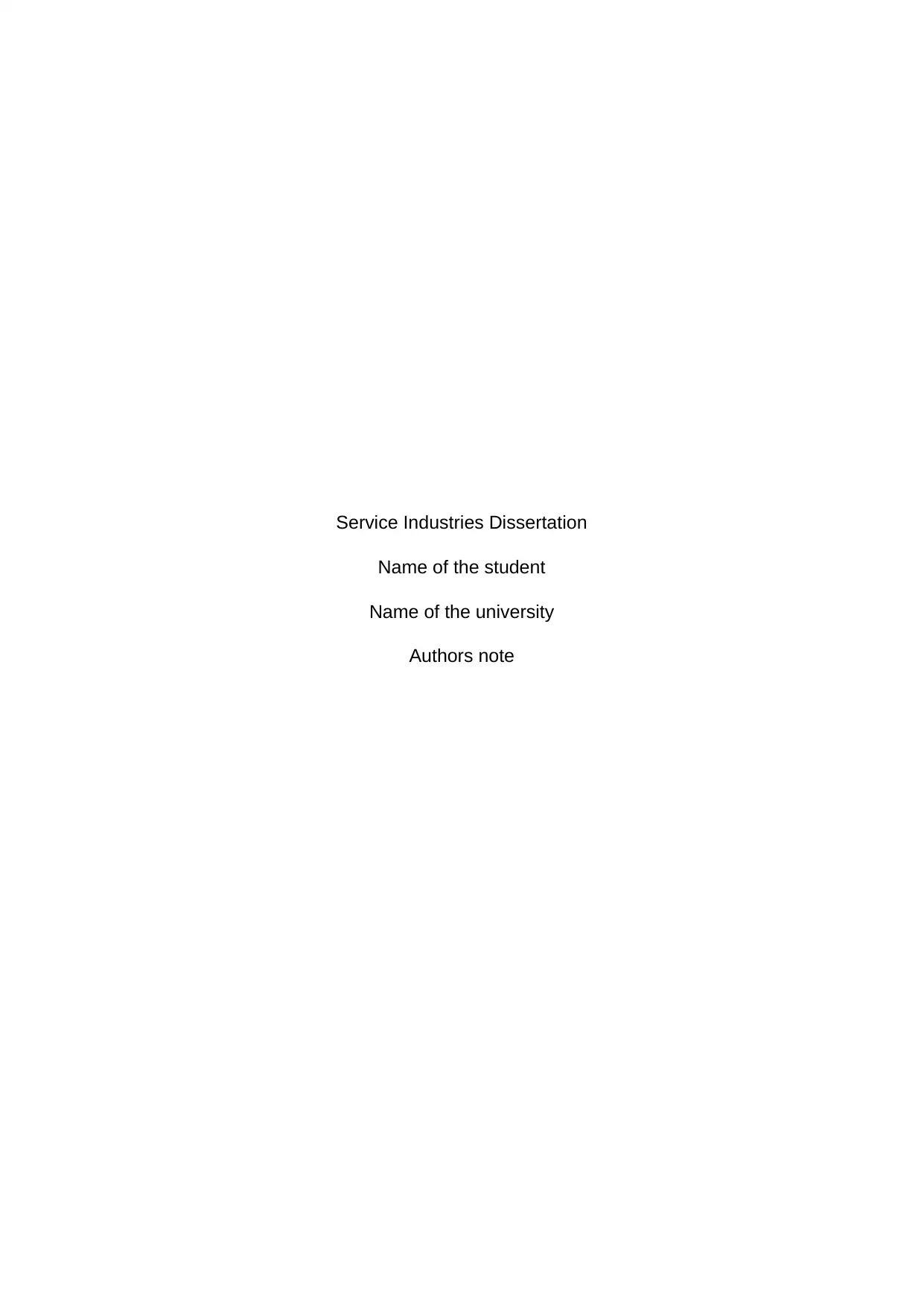
Service Industries Dissertation
Name of the student
Name of the university
Authors note
Name of the student
Name of the university
Authors note
Paraphrase This Document
Need a fresh take? Get an instant paraphrase of this document with our AI Paraphraser

Acknowledgement

Abstract
⊘ This is a preview!⊘
Do you want full access?
Subscribe today to unlock all pages.

Trusted by 1+ million students worldwide

Toc
Paraphrase This Document
Need a fresh take? Get an instant paraphrase of this document with our AI Paraphraser
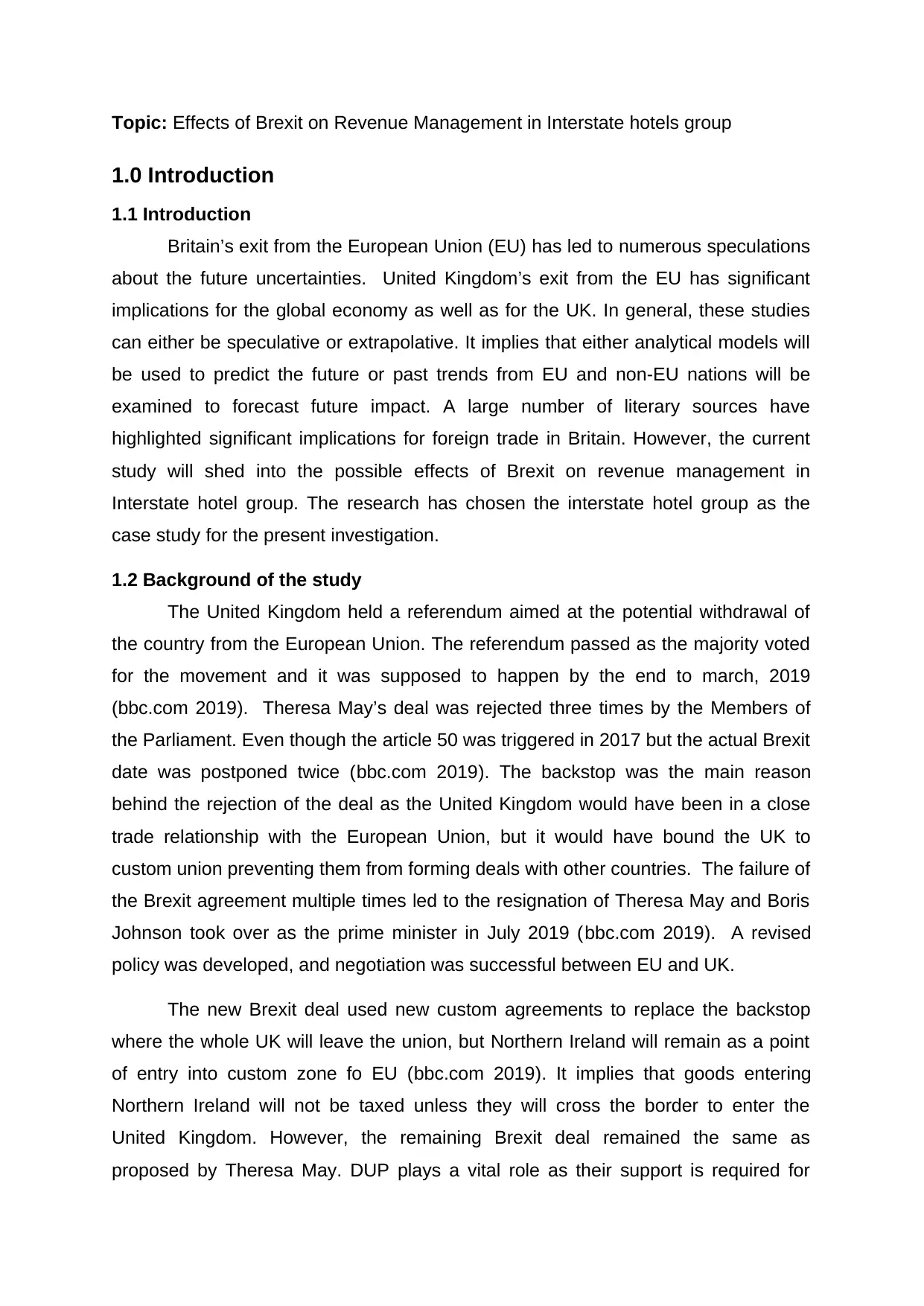
Topic: Effects of Brexit on Revenue Management in Interstate hotels group
1.0 Introduction
1.1 Introduction
Britain’s exit from the European Union (EU) has led to numerous speculations
about the future uncertainties. United Kingdom’s exit from the EU has significant
implications for the global economy as well as for the UK. In general, these studies
can either be speculative or extrapolative. It implies that either analytical models will
be used to predict the future or past trends from EU and non-EU nations will be
examined to forecast future impact. A large number of literary sources have
highlighted significant implications for foreign trade in Britain. However, the current
study will shed into the possible effects of Brexit on revenue management in
Interstate hotel group. The research has chosen the interstate hotel group as the
case study for the present investigation.
1.2 Background of the study
The United Kingdom held a referendum aimed at the potential withdrawal of
the country from the European Union. The referendum passed as the majority voted
for the movement and it was supposed to happen by the end to march, 2019
(bbc.com 2019). Theresa May’s deal was rejected three times by the Members of
the Parliament. Even though the article 50 was triggered in 2017 but the actual Brexit
date was postponed twice (bbc.com 2019). The backstop was the main reason
behind the rejection of the deal as the United Kingdom would have been in a close
trade relationship with the European Union, but it would have bound the UK to
custom union preventing them from forming deals with other countries. The failure of
the Brexit agreement multiple times led to the resignation of Theresa May and Boris
Johnson took over as the prime minister in July 2019 (bbc.com 2019). A revised
policy was developed, and negotiation was successful between EU and UK.
The new Brexit deal used new custom agreements to replace the backstop
where the whole UK will leave the union, but Northern Ireland will remain as a point
of entry into custom zone fo EU (bbc.com 2019). It implies that goods entering
Northern Ireland will not be taxed unless they will cross the border to enter the
United Kingdom. However, the remaining Brexit deal remained the same as
proposed by Theresa May. DUP plays a vital role as their support is required for
1.0 Introduction
1.1 Introduction
Britain’s exit from the European Union (EU) has led to numerous speculations
about the future uncertainties. United Kingdom’s exit from the EU has significant
implications for the global economy as well as for the UK. In general, these studies
can either be speculative or extrapolative. It implies that either analytical models will
be used to predict the future or past trends from EU and non-EU nations will be
examined to forecast future impact. A large number of literary sources have
highlighted significant implications for foreign trade in Britain. However, the current
study will shed into the possible effects of Brexit on revenue management in
Interstate hotel group. The research has chosen the interstate hotel group as the
case study for the present investigation.
1.2 Background of the study
The United Kingdom held a referendum aimed at the potential withdrawal of
the country from the European Union. The referendum passed as the majority voted
for the movement and it was supposed to happen by the end to march, 2019
(bbc.com 2019). Theresa May’s deal was rejected three times by the Members of
the Parliament. Even though the article 50 was triggered in 2017 but the actual Brexit
date was postponed twice (bbc.com 2019). The backstop was the main reason
behind the rejection of the deal as the United Kingdom would have been in a close
trade relationship with the European Union, but it would have bound the UK to
custom union preventing them from forming deals with other countries. The failure of
the Brexit agreement multiple times led to the resignation of Theresa May and Boris
Johnson took over as the prime minister in July 2019 (bbc.com 2019). A revised
policy was developed, and negotiation was successful between EU and UK.
The new Brexit deal used new custom agreements to replace the backstop
where the whole UK will leave the union, but Northern Ireland will remain as a point
of entry into custom zone fo EU (bbc.com 2019). It implies that goods entering
Northern Ireland will not be taxed unless they will cross the border to enter the
United Kingdom. However, the remaining Brexit deal remained the same as
proposed by Theresa May. DUP plays a vital role as their support is required for
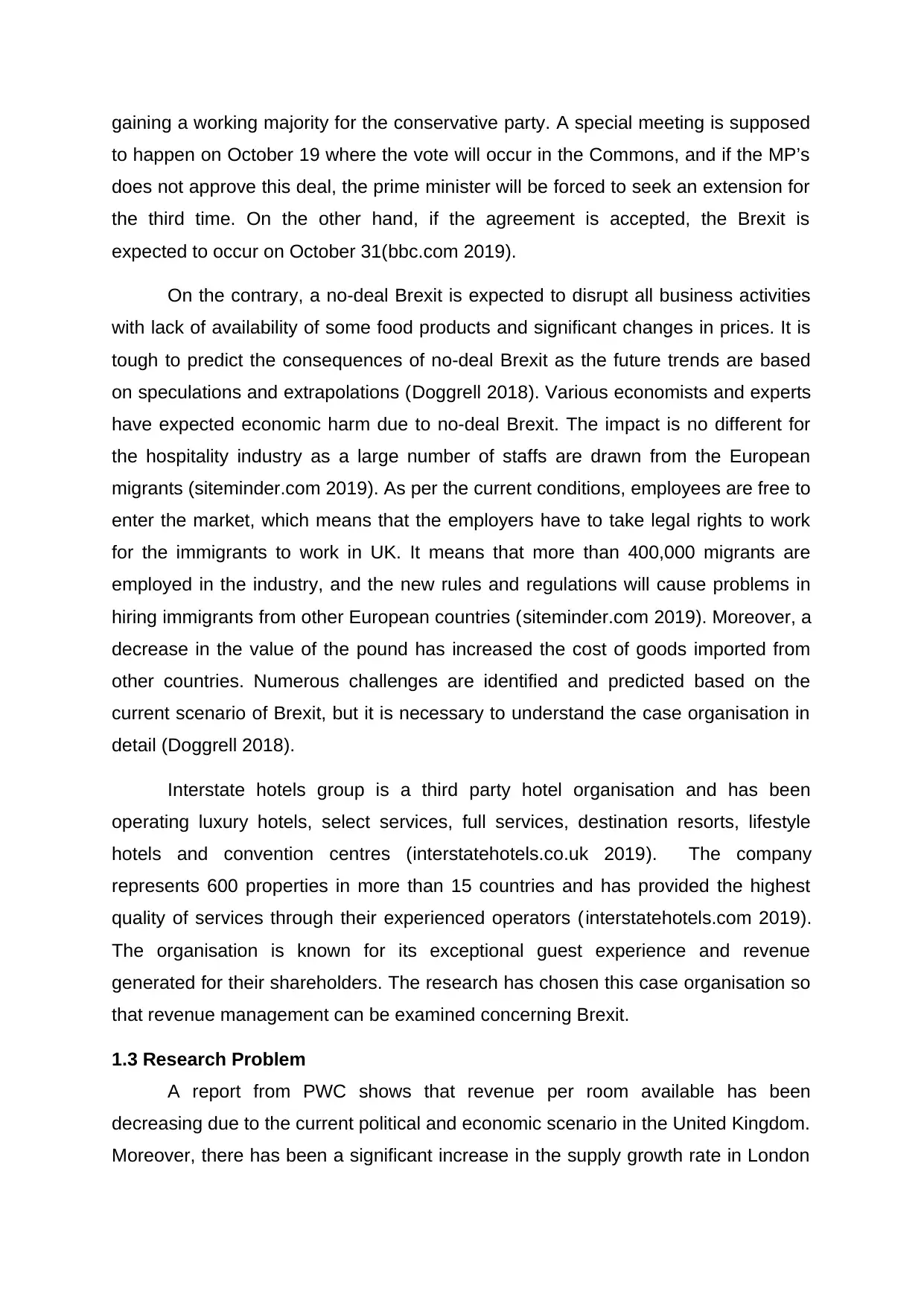
gaining a working majority for the conservative party. A special meeting is supposed
to happen on October 19 where the vote will occur in the Commons, and if the MP’s
does not approve this deal, the prime minister will be forced to seek an extension for
the third time. On the other hand, if the agreement is accepted, the Brexit is
expected to occur on October 31(bbc.com 2019).
On the contrary, a no-deal Brexit is expected to disrupt all business activities
with lack of availability of some food products and significant changes in prices. It is
tough to predict the consequences of no-deal Brexit as the future trends are based
on speculations and extrapolations (Doggrell 2018). Various economists and experts
have expected economic harm due to no-deal Brexit. The impact is no different for
the hospitality industry as a large number of staffs are drawn from the European
migrants (siteminder.com 2019). As per the current conditions, employees are free to
enter the market, which means that the employers have to take legal rights to work
for the immigrants to work in UK. It means that more than 400,000 migrants are
employed in the industry, and the new rules and regulations will cause problems in
hiring immigrants from other European countries (siteminder.com 2019). Moreover, a
decrease in the value of the pound has increased the cost of goods imported from
other countries. Numerous challenges are identified and predicted based on the
current scenario of Brexit, but it is necessary to understand the case organisation in
detail (Doggrell 2018).
Interstate hotels group is a third party hotel organisation and has been
operating luxury hotels, select services, full services, destination resorts, lifestyle
hotels and convention centres (interstatehotels.co.uk 2019). The company
represents 600 properties in more than 15 countries and has provided the highest
quality of services through their experienced operators (interstatehotels.com 2019).
The organisation is known for its exceptional guest experience and revenue
generated for their shareholders. The research has chosen this case organisation so
that revenue management can be examined concerning Brexit.
1.3 Research Problem
A report from PWC shows that revenue per room available has been
decreasing due to the current political and economic scenario in the United Kingdom.
Moreover, there has been a significant increase in the supply growth rate in London
to happen on October 19 where the vote will occur in the Commons, and if the MP’s
does not approve this deal, the prime minister will be forced to seek an extension for
the third time. On the other hand, if the agreement is accepted, the Brexit is
expected to occur on October 31(bbc.com 2019).
On the contrary, a no-deal Brexit is expected to disrupt all business activities
with lack of availability of some food products and significant changes in prices. It is
tough to predict the consequences of no-deal Brexit as the future trends are based
on speculations and extrapolations (Doggrell 2018). Various economists and experts
have expected economic harm due to no-deal Brexit. The impact is no different for
the hospitality industry as a large number of staffs are drawn from the European
migrants (siteminder.com 2019). As per the current conditions, employees are free to
enter the market, which means that the employers have to take legal rights to work
for the immigrants to work in UK. It means that more than 400,000 migrants are
employed in the industry, and the new rules and regulations will cause problems in
hiring immigrants from other European countries (siteminder.com 2019). Moreover, a
decrease in the value of the pound has increased the cost of goods imported from
other countries. Numerous challenges are identified and predicted based on the
current scenario of Brexit, but it is necessary to understand the case organisation in
detail (Doggrell 2018).
Interstate hotels group is a third party hotel organisation and has been
operating luxury hotels, select services, full services, destination resorts, lifestyle
hotels and convention centres (interstatehotels.co.uk 2019). The company
represents 600 properties in more than 15 countries and has provided the highest
quality of services through their experienced operators (interstatehotels.com 2019).
The organisation is known for its exceptional guest experience and revenue
generated for their shareholders. The research has chosen this case organisation so
that revenue management can be examined concerning Brexit.
1.3 Research Problem
A report from PWC shows that revenue per room available has been
decreasing due to the current political and economic scenario in the United Kingdom.
Moreover, there has been a significant increase in the supply growth rate in London
⊘ This is a preview!⊘
Do you want full access?
Subscribe today to unlock all pages.

Trusted by 1+ million students worldwide
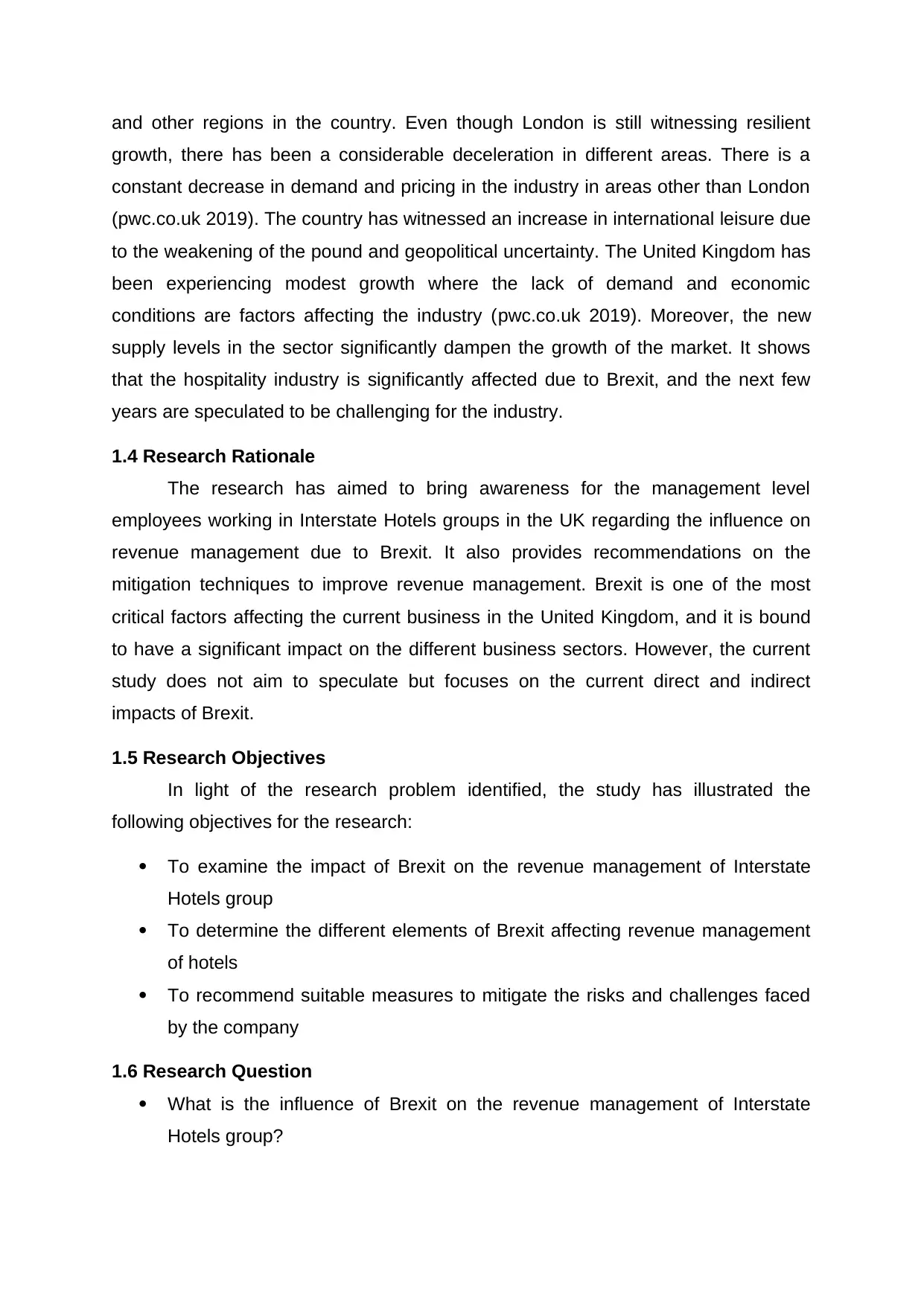
and other regions in the country. Even though London is still witnessing resilient
growth, there has been a considerable deceleration in different areas. There is a
constant decrease in demand and pricing in the industry in areas other than London
(pwc.co.uk 2019). The country has witnessed an increase in international leisure due
to the weakening of the pound and geopolitical uncertainty. The United Kingdom has
been experiencing modest growth where the lack of demand and economic
conditions are factors affecting the industry (pwc.co.uk 2019). Moreover, the new
supply levels in the sector significantly dampen the growth of the market. It shows
that the hospitality industry is significantly affected due to Brexit, and the next few
years are speculated to be challenging for the industry.
1.4 Research Rationale
The research has aimed to bring awareness for the management level
employees working in Interstate Hotels groups in the UK regarding the influence on
revenue management due to Brexit. It also provides recommendations on the
mitigation techniques to improve revenue management. Brexit is one of the most
critical factors affecting the current business in the United Kingdom, and it is bound
to have a significant impact on the different business sectors. However, the current
study does not aim to speculate but focuses on the current direct and indirect
impacts of Brexit.
1.5 Research Objectives
In light of the research problem identified, the study has illustrated the
following objectives for the research:
To examine the impact of Brexit on the revenue management of Interstate
Hotels group
To determine the different elements of Brexit affecting revenue management
of hotels
To recommend suitable measures to mitigate the risks and challenges faced
by the company
1.6 Research Question
What is the influence of Brexit on the revenue management of Interstate
Hotels group?
growth, there has been a considerable deceleration in different areas. There is a
constant decrease in demand and pricing in the industry in areas other than London
(pwc.co.uk 2019). The country has witnessed an increase in international leisure due
to the weakening of the pound and geopolitical uncertainty. The United Kingdom has
been experiencing modest growth where the lack of demand and economic
conditions are factors affecting the industry (pwc.co.uk 2019). Moreover, the new
supply levels in the sector significantly dampen the growth of the market. It shows
that the hospitality industry is significantly affected due to Brexit, and the next few
years are speculated to be challenging for the industry.
1.4 Research Rationale
The research has aimed to bring awareness for the management level
employees working in Interstate Hotels groups in the UK regarding the influence on
revenue management due to Brexit. It also provides recommendations on the
mitigation techniques to improve revenue management. Brexit is one of the most
critical factors affecting the current business in the United Kingdom, and it is bound
to have a significant impact on the different business sectors. However, the current
study does not aim to speculate but focuses on the current direct and indirect
impacts of Brexit.
1.5 Research Objectives
In light of the research problem identified, the study has illustrated the
following objectives for the research:
To examine the impact of Brexit on the revenue management of Interstate
Hotels group
To determine the different elements of Brexit affecting revenue management
of hotels
To recommend suitable measures to mitigate the risks and challenges faced
by the company
1.6 Research Question
What is the influence of Brexit on the revenue management of Interstate
Hotels group?
Paraphrase This Document
Need a fresh take? Get an instant paraphrase of this document with our AI Paraphraser
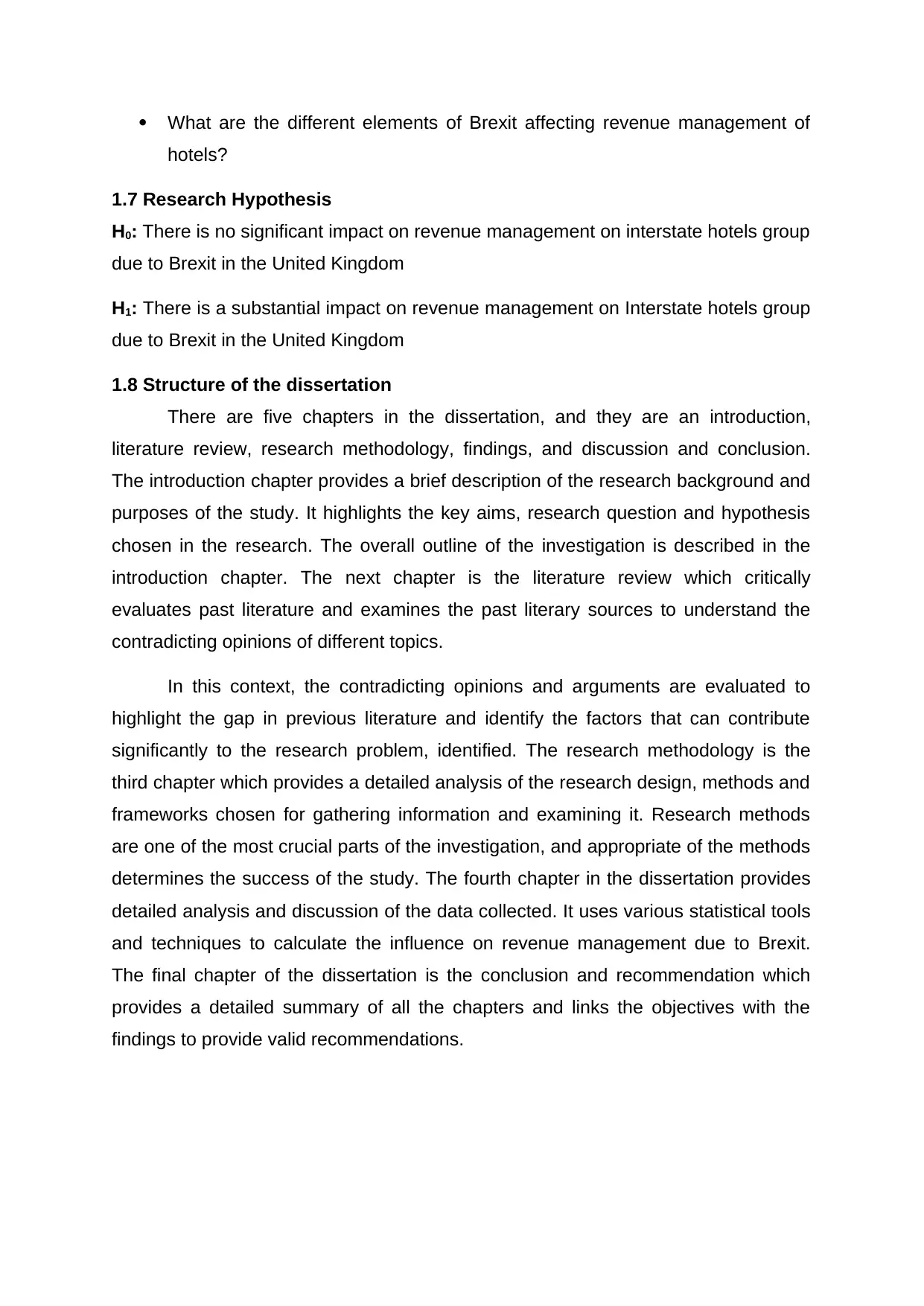
What are the different elements of Brexit affecting revenue management of
hotels?
1.7 Research Hypothesis
H0: There is no significant impact on revenue management on interstate hotels group
due to Brexit in the United Kingdom
H1: There is a substantial impact on revenue management on Interstate hotels group
due to Brexit in the United Kingdom
1.8 Structure of the dissertation
There are five chapters in the dissertation, and they are an introduction,
literature review, research methodology, findings, and discussion and conclusion.
The introduction chapter provides a brief description of the research background and
purposes of the study. It highlights the key aims, research question and hypothesis
chosen in the research. The overall outline of the investigation is described in the
introduction chapter. The next chapter is the literature review which critically
evaluates past literature and examines the past literary sources to understand the
contradicting opinions of different topics.
In this context, the contradicting opinions and arguments are evaluated to
highlight the gap in previous literature and identify the factors that can contribute
significantly to the research problem, identified. The research methodology is the
third chapter which provides a detailed analysis of the research design, methods and
frameworks chosen for gathering information and examining it. Research methods
are one of the most crucial parts of the investigation, and appropriate of the methods
determines the success of the study. The fourth chapter in the dissertation provides
detailed analysis and discussion of the data collected. It uses various statistical tools
and techniques to calculate the influence on revenue management due to Brexit.
The final chapter of the dissertation is the conclusion and recommendation which
provides a detailed summary of all the chapters and links the objectives with the
findings to provide valid recommendations.
hotels?
1.7 Research Hypothesis
H0: There is no significant impact on revenue management on interstate hotels group
due to Brexit in the United Kingdom
H1: There is a substantial impact on revenue management on Interstate hotels group
due to Brexit in the United Kingdom
1.8 Structure of the dissertation
There are five chapters in the dissertation, and they are an introduction,
literature review, research methodology, findings, and discussion and conclusion.
The introduction chapter provides a brief description of the research background and
purposes of the study. It highlights the key aims, research question and hypothesis
chosen in the research. The overall outline of the investigation is described in the
introduction chapter. The next chapter is the literature review which critically
evaluates past literature and examines the past literary sources to understand the
contradicting opinions of different topics.
In this context, the contradicting opinions and arguments are evaluated to
highlight the gap in previous literature and identify the factors that can contribute
significantly to the research problem, identified. The research methodology is the
third chapter which provides a detailed analysis of the research design, methods and
frameworks chosen for gathering information and examining it. Research methods
are one of the most crucial parts of the investigation, and appropriate of the methods
determines the success of the study. The fourth chapter in the dissertation provides
detailed analysis and discussion of the data collected. It uses various statistical tools
and techniques to calculate the influence on revenue management due to Brexit.
The final chapter of the dissertation is the conclusion and recommendation which
provides a detailed summary of all the chapters and links the objectives with the
findings to provide valid recommendations.
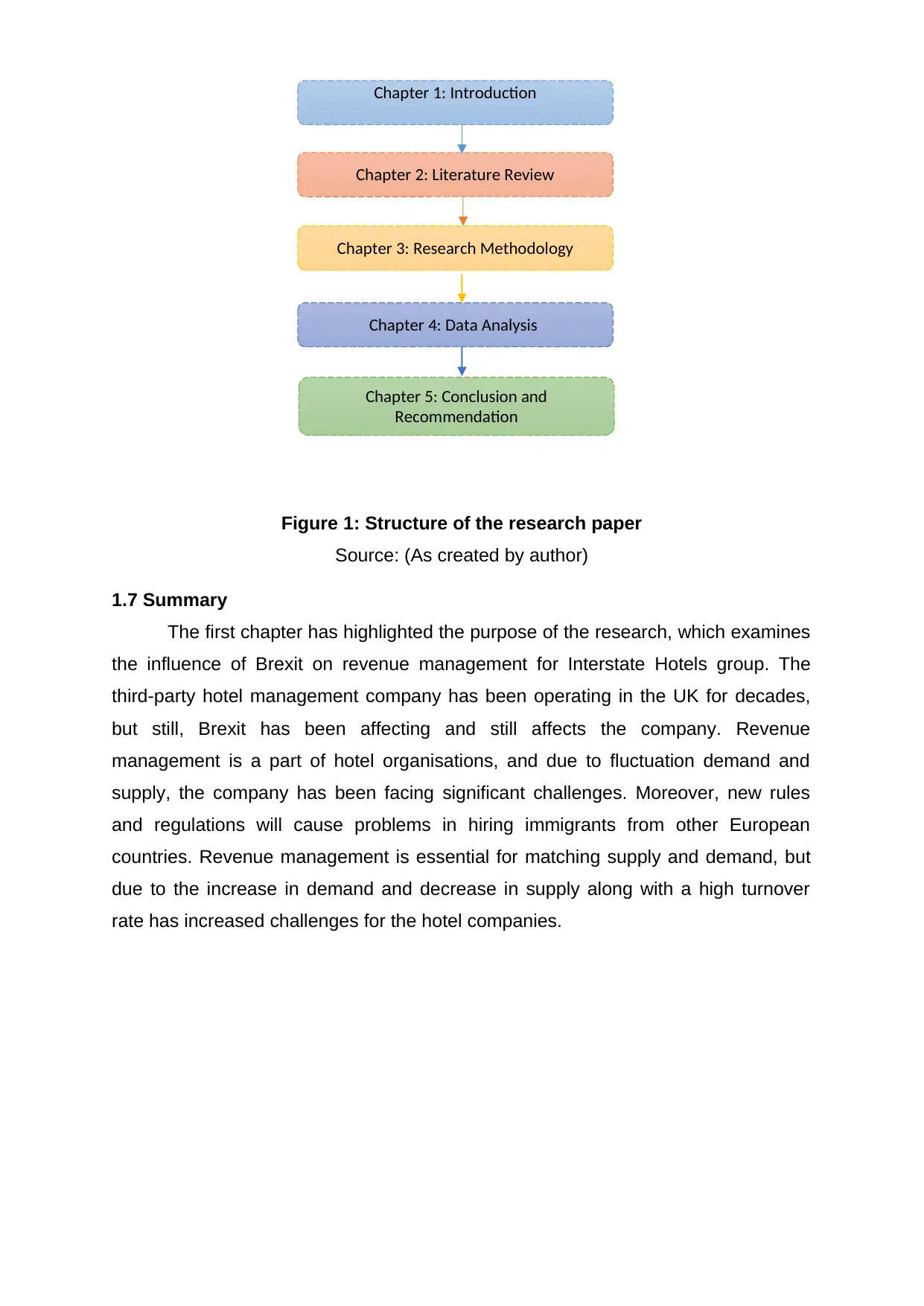
Figure 1: Structure of the research paper
Source: (As created by author)
1.7 Summary
The first chapter has highlighted the purpose of the research, which examines
the influence of Brexit on revenue management for Interstate Hotels group. The
third-party hotel management company has been operating in the UK for decades,
but still, Brexit has been affecting and still affects the company. Revenue
management is a part of hotel organisations, and due to fluctuation demand and
supply, the company has been facing significant challenges. Moreover, new rules
and regulations will cause problems in hiring immigrants from other European
countries. Revenue management is essential for matching supply and demand, but
due to the increase in demand and decrease in supply along with a high turnover
rate has increased challenges for the hotel companies.
Chapter 5: Conclusion and
Recommendation
Chapter 4: Data Analysis
Chapter 1: Introduction
Chapter 2: Literature Review
Chapter 3: Research Methodology
Source: (As created by author)
1.7 Summary
The first chapter has highlighted the purpose of the research, which examines
the influence of Brexit on revenue management for Interstate Hotels group. The
third-party hotel management company has been operating in the UK for decades,
but still, Brexit has been affecting and still affects the company. Revenue
management is a part of hotel organisations, and due to fluctuation demand and
supply, the company has been facing significant challenges. Moreover, new rules
and regulations will cause problems in hiring immigrants from other European
countries. Revenue management is essential for matching supply and demand, but
due to the increase in demand and decrease in supply along with a high turnover
rate has increased challenges for the hotel companies.
Chapter 5: Conclusion and
Recommendation
Chapter 4: Data Analysis
Chapter 1: Introduction
Chapter 2: Literature Review
Chapter 3: Research Methodology
⊘ This is a preview!⊘
Do you want full access?
Subscribe today to unlock all pages.

Trusted by 1+ million students worldwide
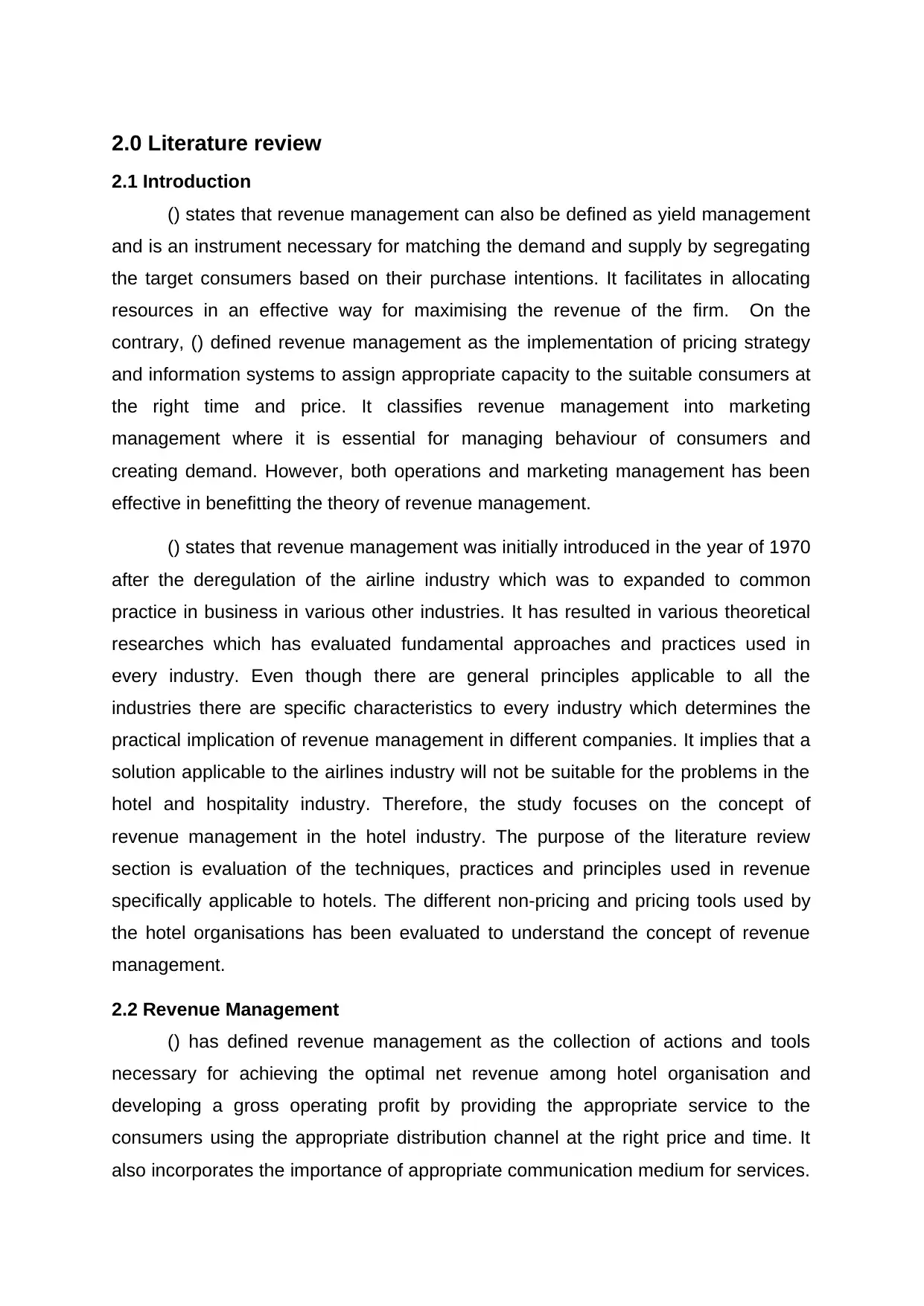
2.0 Literature review
2.1 Introduction
() states that revenue management can also be defined as yield management
and is an instrument necessary for matching the demand and supply by segregating
the target consumers based on their purchase intentions. It facilitates in allocating
resources in an effective way for maximising the revenue of the firm. On the
contrary, () defined revenue management as the implementation of pricing strategy
and information systems to assign appropriate capacity to the suitable consumers at
the right time and price. It classifies revenue management into marketing
management where it is essential for managing behaviour of consumers and
creating demand. However, both operations and marketing management has been
effective in benefitting the theory of revenue management.
() states that revenue management was initially introduced in the year of 1970
after the deregulation of the airline industry which was to expanded to common
practice in business in various other industries. It has resulted in various theoretical
researches which has evaluated fundamental approaches and practices used in
every industry. Even though there are general principles applicable to all the
industries there are specific characteristics to every industry which determines the
practical implication of revenue management in different companies. It implies that a
solution applicable to the airlines industry will not be suitable for the problems in the
hotel and hospitality industry. Therefore, the study focuses on the concept of
revenue management in the hotel industry. The purpose of the literature review
section is evaluation of the techniques, practices and principles used in revenue
specifically applicable to hotels. The different non-pricing and pricing tools used by
the hotel organisations has been evaluated to understand the concept of revenue
management.
2.2 Revenue Management
() has defined revenue management as the collection of actions and tools
necessary for achieving the optimal net revenue among hotel organisation and
developing a gross operating profit by providing the appropriate service to the
consumers using the appropriate distribution channel at the right price and time. It
also incorporates the importance of appropriate communication medium for services.
2.1 Introduction
() states that revenue management can also be defined as yield management
and is an instrument necessary for matching the demand and supply by segregating
the target consumers based on their purchase intentions. It facilitates in allocating
resources in an effective way for maximising the revenue of the firm. On the
contrary, () defined revenue management as the implementation of pricing strategy
and information systems to assign appropriate capacity to the suitable consumers at
the right time and price. It classifies revenue management into marketing
management where it is essential for managing behaviour of consumers and
creating demand. However, both operations and marketing management has been
effective in benefitting the theory of revenue management.
() states that revenue management was initially introduced in the year of 1970
after the deregulation of the airline industry which was to expanded to common
practice in business in various other industries. It has resulted in various theoretical
researches which has evaluated fundamental approaches and practices used in
every industry. Even though there are general principles applicable to all the
industries there are specific characteristics to every industry which determines the
practical implication of revenue management in different companies. It implies that a
solution applicable to the airlines industry will not be suitable for the problems in the
hotel and hospitality industry. Therefore, the study focuses on the concept of
revenue management in the hotel industry. The purpose of the literature review
section is evaluation of the techniques, practices and principles used in revenue
specifically applicable to hotels. The different non-pricing and pricing tools used by
the hotel organisations has been evaluated to understand the concept of revenue
management.
2.2 Revenue Management
() has defined revenue management as the collection of actions and tools
necessary for achieving the optimal net revenue among hotel organisation and
developing a gross operating profit by providing the appropriate service to the
consumers using the appropriate distribution channel at the right price and time. It
also incorporates the importance of appropriate communication medium for services.
Paraphrase This Document
Need a fresh take? Get an instant paraphrase of this document with our AI Paraphraser
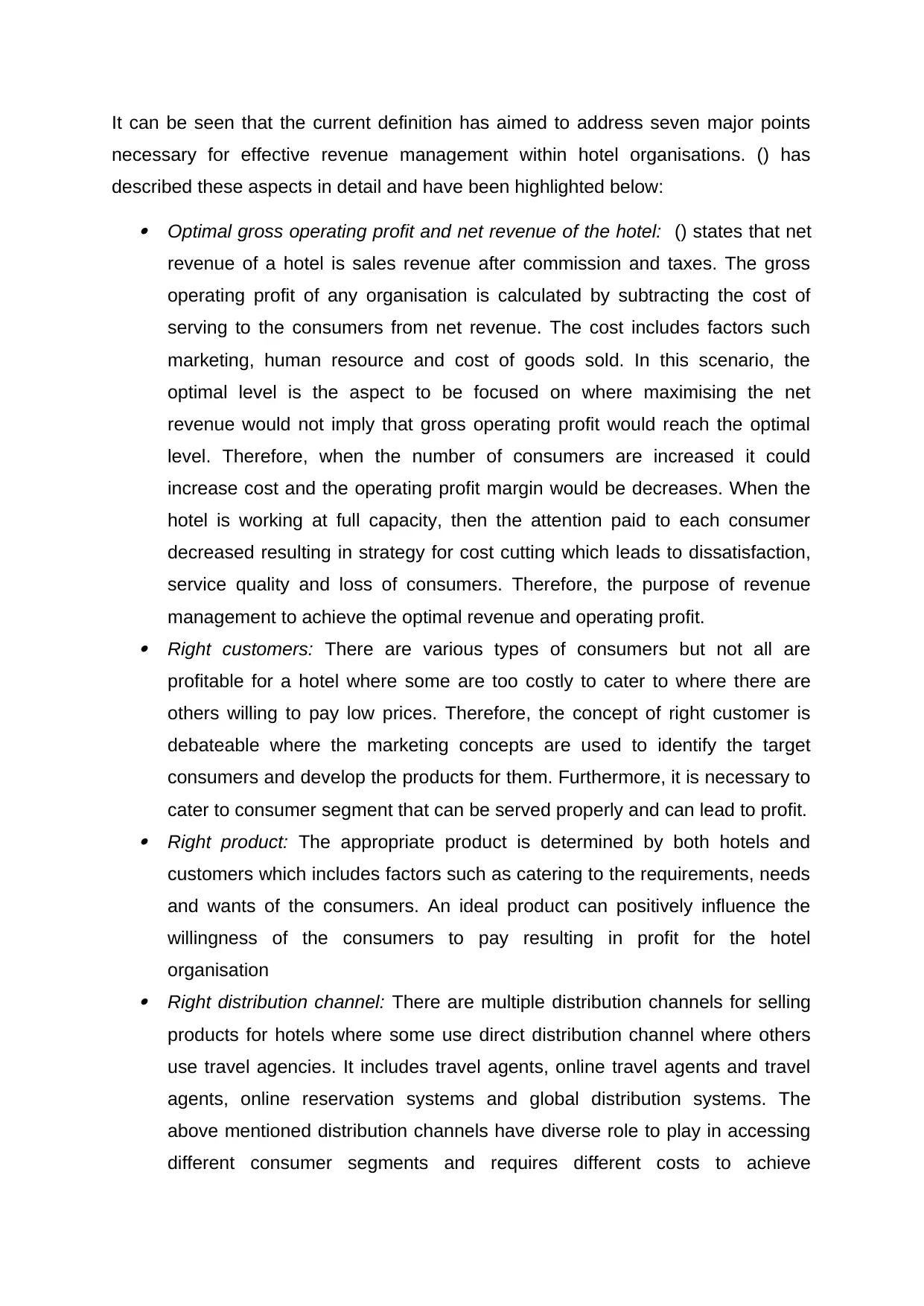
It can be seen that the current definition has aimed to address seven major points
necessary for effective revenue management within hotel organisations. () has
described these aspects in detail and have been highlighted below: Optimal gross operating profit and net revenue of the hotel: () states that net
revenue of a hotel is sales revenue after commission and taxes. The gross
operating profit of any organisation is calculated by subtracting the cost of
serving to the consumers from net revenue. The cost includes factors such
marketing, human resource and cost of goods sold. In this scenario, the
optimal level is the aspect to be focused on where maximising the net
revenue would not imply that gross operating profit would reach the optimal
level. Therefore, when the number of consumers are increased it could
increase cost and the operating profit margin would be decreases. When the
hotel is working at full capacity, then the attention paid to each consumer
decreased resulting in strategy for cost cutting which leads to dissatisfaction,
service quality and loss of consumers. Therefore, the purpose of revenue
management to achieve the optimal revenue and operating profit. Right customers: There are various types of consumers but not all are
profitable for a hotel where some are too costly to cater to where there are
others willing to pay low prices. Therefore, the concept of right customer is
debateable where the marketing concepts are used to identify the target
consumers and develop the products for them. Furthermore, it is necessary to
cater to consumer segment that can be served properly and can lead to profit. Right product: The appropriate product is determined by both hotels and
customers which includes factors such as catering to the requirements, needs
and wants of the consumers. An ideal product can positively influence the
willingness of the consumers to pay resulting in profit for the hotel
organisation Right distribution channel: There are multiple distribution channels for selling
products for hotels where some use direct distribution channel where others
use travel agencies. It includes travel agents, online travel agents and travel
agents, online reservation systems and global distribution systems. The
above mentioned distribution channels have diverse role to play in accessing
different consumer segments and requires different costs to achieve
necessary for effective revenue management within hotel organisations. () has
described these aspects in detail and have been highlighted below: Optimal gross operating profit and net revenue of the hotel: () states that net
revenue of a hotel is sales revenue after commission and taxes. The gross
operating profit of any organisation is calculated by subtracting the cost of
serving to the consumers from net revenue. The cost includes factors such
marketing, human resource and cost of goods sold. In this scenario, the
optimal level is the aspect to be focused on where maximising the net
revenue would not imply that gross operating profit would reach the optimal
level. Therefore, when the number of consumers are increased it could
increase cost and the operating profit margin would be decreases. When the
hotel is working at full capacity, then the attention paid to each consumer
decreased resulting in strategy for cost cutting which leads to dissatisfaction,
service quality and loss of consumers. Therefore, the purpose of revenue
management to achieve the optimal revenue and operating profit. Right customers: There are various types of consumers but not all are
profitable for a hotel where some are too costly to cater to where there are
others willing to pay low prices. Therefore, the concept of right customer is
debateable where the marketing concepts are used to identify the target
consumers and develop the products for them. Furthermore, it is necessary to
cater to consumer segment that can be served properly and can lead to profit. Right product: The appropriate product is determined by both hotels and
customers which includes factors such as catering to the requirements, needs
and wants of the consumers. An ideal product can positively influence the
willingness of the consumers to pay resulting in profit for the hotel
organisation Right distribution channel: There are multiple distribution channels for selling
products for hotels where some use direct distribution channel where others
use travel agencies. It includes travel agents, online travel agents and travel
agents, online reservation systems and global distribution systems. The
above mentioned distribution channels have diverse role to play in accessing
different consumer segments and requires different costs to achieve
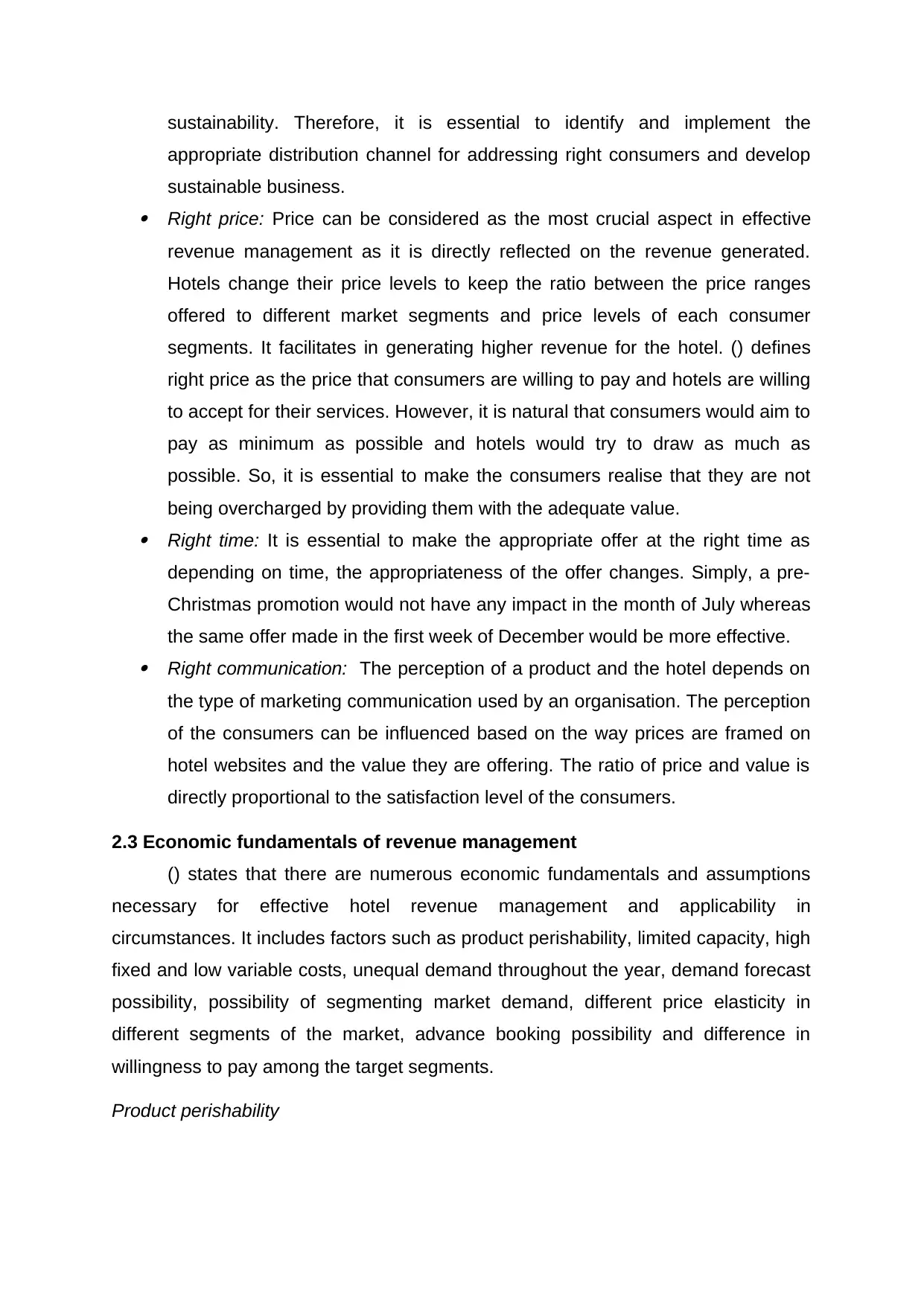
sustainability. Therefore, it is essential to identify and implement the
appropriate distribution channel for addressing right consumers and develop
sustainable business. Right price: Price can be considered as the most crucial aspect in effective
revenue management as it is directly reflected on the revenue generated.
Hotels change their price levels to keep the ratio between the price ranges
offered to different market segments and price levels of each consumer
segments. It facilitates in generating higher revenue for the hotel. () defines
right price as the price that consumers are willing to pay and hotels are willing
to accept for their services. However, it is natural that consumers would aim to
pay as minimum as possible and hotels would try to draw as much as
possible. So, it is essential to make the consumers realise that they are not
being overcharged by providing them with the adequate value. Right time: It is essential to make the appropriate offer at the right time as
depending on time, the appropriateness of the offer changes. Simply, a pre-
Christmas promotion would not have any impact in the month of July whereas
the same offer made in the first week of December would be more effective. Right communication: The perception of a product and the hotel depends on
the type of marketing communication used by an organisation. The perception
of the consumers can be influenced based on the way prices are framed on
hotel websites and the value they are offering. The ratio of price and value is
directly proportional to the satisfaction level of the consumers.
2.3 Economic fundamentals of revenue management
() states that there are numerous economic fundamentals and assumptions
necessary for effective hotel revenue management and applicability in
circumstances. It includes factors such as product perishability, limited capacity, high
fixed and low variable costs, unequal demand throughout the year, demand forecast
possibility, possibility of segmenting market demand, different price elasticity in
different segments of the market, advance booking possibility and difference in
willingness to pay among the target segments.
Product perishability
appropriate distribution channel for addressing right consumers and develop
sustainable business. Right price: Price can be considered as the most crucial aspect in effective
revenue management as it is directly reflected on the revenue generated.
Hotels change their price levels to keep the ratio between the price ranges
offered to different market segments and price levels of each consumer
segments. It facilitates in generating higher revenue for the hotel. () defines
right price as the price that consumers are willing to pay and hotels are willing
to accept for their services. However, it is natural that consumers would aim to
pay as minimum as possible and hotels would try to draw as much as
possible. So, it is essential to make the consumers realise that they are not
being overcharged by providing them with the adequate value. Right time: It is essential to make the appropriate offer at the right time as
depending on time, the appropriateness of the offer changes. Simply, a pre-
Christmas promotion would not have any impact in the month of July whereas
the same offer made in the first week of December would be more effective. Right communication: The perception of a product and the hotel depends on
the type of marketing communication used by an organisation. The perception
of the consumers can be influenced based on the way prices are framed on
hotel websites and the value they are offering. The ratio of price and value is
directly proportional to the satisfaction level of the consumers.
2.3 Economic fundamentals of revenue management
() states that there are numerous economic fundamentals and assumptions
necessary for effective hotel revenue management and applicability in
circumstances. It includes factors such as product perishability, limited capacity, high
fixed and low variable costs, unequal demand throughout the year, demand forecast
possibility, possibility of segmenting market demand, different price elasticity in
different segments of the market, advance booking possibility and difference in
willingness to pay among the target segments.
Product perishability
⊘ This is a preview!⊘
Do you want full access?
Subscribe today to unlock all pages.

Trusted by 1+ million students worldwide
1 out of 19
Related Documents
Your All-in-One AI-Powered Toolkit for Academic Success.
+13062052269
info@desklib.com
Available 24*7 on WhatsApp / Email
![[object Object]](/_next/static/media/star-bottom.7253800d.svg)
Unlock your academic potential
Copyright © 2020–2026 A2Z Services. All Rights Reserved. Developed and managed by ZUCOL.





